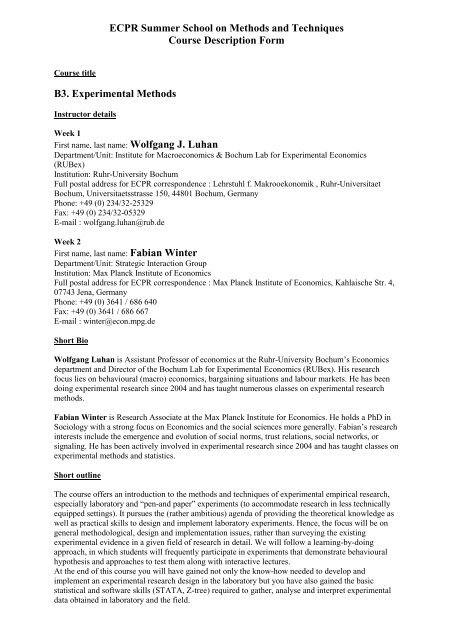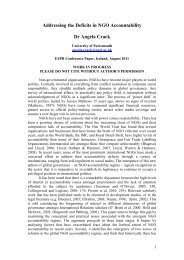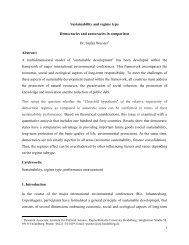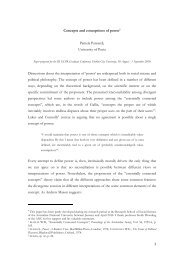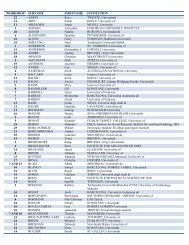course outline (pdf)
course outline (pdf)
course outline (pdf)
Create successful ePaper yourself
Turn your PDF publications into a flip-book with our unique Google optimized e-Paper software.
Course title<br />
ECPR Summer School on Methods and Techniques<br />
Course Description Form<br />
B3. Experimental Methods<br />
Instructor details<br />
Week 1<br />
First name, last name: Wolfgang J. Luhan<br />
Department/Unit: Institute for Macroeconomics & Bochum Lab for Experimental Economics<br />
(RUBex)<br />
Institution: Ruhr-University Bochum<br />
Full postal address for ECPR correspondence : Lehrstuhl f. Makrooekonomik , Ruhr-Universitaet<br />
Bochum, Universitaetsstrasse 150, 44801 Bochum, Germany<br />
Phone: +49 (0) 234/32-25329<br />
Fax: +49 (0) 234/32-05329<br />
E-mail : wolfgang.luhan@rub.de<br />
Week 2<br />
First name, last name: Fabian Winter<br />
Department/Unit: Strategic Interaction Group<br />
Institution: Max Planck Institute of Economics<br />
Full postal address for ECPR correspondence : Max Planck Institute of Economics, Kahlaische Str. 4,<br />
07743 Jena, Germany<br />
Phone: +49 (0) 3641 / 686 640<br />
Fax: +49 (0) 3641 / 686 667<br />
E-mail : winter@econ.mpg.de<br />
Short Bio<br />
Wolfgang Luhan is Assistant Professor of economics at the Ruhr-University Bochum’s Economics<br />
department and Director of the Bochum Lab for Experimental Economics (RUBex). His research<br />
focus lies on behavioural (macro) economics, bargaining situations and labour markets. He has been<br />
doing experimental research since 2004 and has taught numerous classes on experimental research<br />
methods.<br />
Fabian Winter is Research Associate at the Max Planck Institute for Economics. He holds a PhD in<br />
Sociology with a strong focus on Economics and the social sciences more generally. Fabian’s research<br />
interests include the emergence and evolution of social norms, trust relations, social networks, or<br />
signaling. He has been actively involved in experimental research since 2004 and has taught classes on<br />
experimental methods and statistics.<br />
Short <strong>outline</strong><br />
The <strong>course</strong> offers an introduction to the methods and techniques of experimental empirical research,<br />
especially laboratory and “pen-and paper” experiments (to accommodate research in less technically<br />
equipped settings). It pursues the (rather ambitious) agenda of providing the theoretical knowledge as<br />
well as practical skills to design and implement laboratory experiments. Hence, the focus will be on<br />
general methodological, design and implementation issues, rather than surveying the existing<br />
experimental evidence in a given field of research in detail. We will follow a learning-by-doing<br />
approach, in which students will frequently participate in experiments that demonstrate behavioural<br />
hypothesis and approaches to test them along with interactive lectures.<br />
At the end of this <strong>course</strong> you will have gained not only the know-how needed to develop and<br />
implement an experimental research design in the laboratory but you have also gained the basic<br />
statistical and software skills (STATA, Z-tree) required to gather, analyse and interpret experimental<br />
data obtained in laboratory and the field.
Long <strong>outline</strong><br />
The <strong>course</strong> will be divided in two sessions per day. The daily afternoon sessions will introduce the<br />
basic concepts, conventions and common practical problems of experimental research in the social<br />
sciences. These lectures will be accompanied by group work and (mostly) pen-and-paper classroom<br />
experiments to give a first look-and-feel of participating in experiments and interpreting the collected<br />
data.<br />
The evening sessions will take place in the computer pool and will introduce the students to the<br />
software package zTree, designed to carry out lab experiments. The timing of the evening sessions will<br />
depend on how fast we proceed and will cover the basics (and hopefully more) of implementing zTree<br />
treatments. The students will learn all steps necessary to implement simple experiments hands-on in<br />
small groups, supported by the teaching staff. We will follow the structure of the tutorial to zTree, and<br />
students will program many treatments themselves. At the end of the two weeks <strong>course</strong>, the students<br />
will have learned the structure and language of zTree as well as all the important features of the<br />
program, enabling them to program their own experiments.<br />
The lectures in week 1 will by and large cover the theoretical foundations of experiments and the<br />
fundamental concepts of game theory underlying many experimental studies in the social sciences.<br />
Week 2 will introduce the more practical issues of planning, implementing and running experiments.<br />
In week 1, the <strong>course</strong> will start with group work a first experiment and an overview of the history of<br />
experimental research in the social sciences. We will mainly focus on the development of<br />
experimental economics, which has substantially departed from the methodological conventions of<br />
other disciplines like e,g, social psychology. Furthermore, we stress the idea of theory-led research,<br />
where theoretical hypotheses are tested in lab experiments. There will be no programming exercise in<br />
zTree on the first day, but we will give an overview of the program instead.<br />
Day 2 will discuss theoretical considerations about why one would want to run an experiment.<br />
Experiments can be designed in order to test and to develop better theories, but also to give evidence<br />
based advice. Experiments are particularly suited for these purposes, as they have distinct features that<br />
enable causal inferences about the relationship between two or more variables of interest: They are<br />
usually strong in internal validity. Yet, they do have (sometimes severe) limitations, depending on the<br />
environment in which they are carried out and the subjects participating in them. Both, strength and<br />
weaknesses of experimental research will be carefully discussed.<br />
Day 3 will give a more in-depth discussion of the philosophy of experimental research more generally,<br />
with a focus on the social sciences. We will furthermore discuss the empirical research topics covered<br />
in the last decades and those “hot” today.<br />
The remaining two days of week one will give an introduction into the basic concepts of expected<br />
utility and game theory, starting with von Neumann/Morgenstern utility, the “Prisoners’ Dilemma”<br />
game and the concepts of dominance as well as pure nash equilibria, and will continue with mixed<br />
Nash Equilibria and how to find them in games like the “battle of the sexes”. No prior knowledge of<br />
game theory is required here, though basic economic thinking will be helpful.<br />
In week 2, we dive deeper into the practical issues of design implementation and analysis of<br />
experiments.<br />
Day 6 will start with the most fundamental assumption of experimental economics: Induced Value<br />
Theory states that the experimentalist can translate preferences into money and thus control and<br />
manipulate the incentives of the subject participating in the experiment. This – obviously controversial<br />
– claim is the reason for monetary incentives in economics experiments even outside the narrow<br />
domain of markets.<br />
Day 7 starts with the essentials of running experiments: Terminology (what is a treatment, a session,<br />
…), steps to take to design and run an experiment (including how to find a good research question),<br />
do’s and don’ts of experimental research and the particular, sometimes contradicting, rules in different<br />
academic disciplines. We will for instance discuss controversy over the rule (not) to deceive subjects<br />
between economists and psychologists or the pros and cons of paying subjects according to their<br />
performance.
Days 8 and 9 will be devoted to the most practical issues of experimental research. How do I design a<br />
study? Where and how can you apply for money? In which mode should I conduct the experiment,<br />
computerised or paper-pencil? How do I get people to come to the lab? Once they are in the lab, which<br />
particular steps do I have to take during an experiment? These two days are planned to be less<br />
theoretical than some of the days before and should give many useful tips from and for the<br />
practitioner’s side. We will, for instance, discuss how to write good instructions, and how poorly<br />
written ones can spoil an experiment.<br />
The last day will give an introduction into non-parametric statistical methods. Other than parametric<br />
approaches (e.g. t-test, OLS regressions), non-parametric testing makes only very limited assumptions<br />
about the structure of the analyzed data. This is particularly helpful if the per-cell sample size is rather<br />
small, as in most experimental studies. We will discuss the non-parametric alternative to the most<br />
important parametric test like Mann-Whitney instead of the t-test.<br />
5. Day-to-day schedule<br />
- Week 1<br />
Topic(s) Details [NB : incl. timing of lecture v/s lab or<br />
fieldwork etc. hours]<br />
Day 1 General Introduction/Group<br />
work/History/z-Tree Intro<br />
14:00 -17:00: Classroom only<br />
Day 2 Reasons for<br />
14:00 -15:30: Classroom<br />
Experiments/Typology/Duhem-<br />
Quine Thesis/Advantages &<br />
Limitations/Validity<br />
16:00 – 17:00: lab<br />
Day 3 Reductionism/Methodological 14:00 -15:30: Classroom<br />
Challenges/Major Results 16:00 – 17:00: lab<br />
Day 4 Game Theory Intro:<br />
14:00 -15:30: Classroom<br />
Prisoners Dilemma<br />
16:00 – 17:00: lab<br />
Day 5 Game Theory Intro:<br />
14:00 -15:30: Classroom<br />
Battle of Sexes<br />
16:00 – 17:00: lab<br />
- Week 2<br />
Day 6 Induced Valuation Theory 14:00 -15:30: Classroom<br />
Day 7 Essentials/Terminology/Steps/<br />
Economic vs. Psychological<br />
Experiments/Deception/<br />
Monetary incentives<br />
Day 8 Design Questions<br />
/Trials/Hypotheses/<br />
Implementation 1: Getting<br />
Money/Writing Instructions<br />
Day 9 Implementation 2:<br />
Recruiting/Programming/Prepar<br />
ing the Session/Payoffs<br />
16:00 – 17:00: lab<br />
14:00 -15:30: Classroom<br />
16:00 – 17:00: lab<br />
14:00 -15:30: Classroom<br />
16:00 – 17:00: lab<br />
14:00 -15:30: Classroom<br />
16:00 – 17:00: lab<br />
Day 10 Non-Parametric Statistics 14:00 -15:30: Classroom<br />
16:00 – 17:00: lab<br />
Day 11 -<br />
Saturday<br />
Exam 9:00 – 12:00<br />
Day-to-day reading list<br />
- Week 1<br />
Readings (please read at least the compulsory reading for the scheduled day)<br />
Day 1 Chapter 1: Experimental Political Science in Perspective. in Kittel et al. 2012 (see<br />
below); z-Tree Tutorial pp. 1-13<br />
Day 2 Chapter 1.I. in Kagel and Roth 1997 (see below); z-Tree Tutorial pp. 14-25<br />
Day 3 Chapter 1.III.F. in Kagel and Roth 1997 (see below) ; z-Tree Tutorial pp. 26-33
Day 4 Capter 1 up to 1.1.C. in Gibbons 1992 (see below) ; z-Tree Tutorial pp. 34-41<br />
Day 5 ; z-Tree Tutorial pp. 42-52<br />
- Week 2<br />
Day 6 Smith, V.L. (1976): Experimental economics: induced value theory. American<br />
Economic Review 66 (2): 274-79; Smith, V. L. (1994): Economics in the laboratory.<br />
Journal of Economic Perspectives 8(1): 113-131. ; z-Tree Tutorial pp. 52-57<br />
Day 7 Morton, R.B. and K. Williams (2010): Experimental Political Science and the Study<br />
of Causality. From Nature to the Lab. Cambridge: Cambridge University Press.<br />
Pp. 363-378<br />
; z-Tree Tutorial pp. 57-66<br />
Day 8 Friedman, D., and S. Sunder (1994) Experimental Methods: A Primer for<br />
Economists. (Cambridge: Cambridge University Press).<br />
pp.38-71 ; z-Tree Tutorial pp. 67-76<br />
Day 9 Friedman, D., and S. Sunder (1994) Experimental Methods: A Primer for<br />
Economists. (Cambridge: Cambridge University Press).<br />
pp.74-82; z-Tree Tutorial pp. 77-86<br />
Day 10 Friedman, D., and S. Sunder (1994) Experimental Methods: A Primer for<br />
Economists. (Cambridge: Cambridge University Press).<br />
pp.85-116; z-Tree Tutorial pp. 86-91<br />
Requested prior knowledge<br />
Basic economic thinking (micro-economics), deductive reasoning, and strategic thinking. Knowledge<br />
of standard game-theoretic concepts is helpful but no precondition. Some acquaintance with statistics<br />
and basic programming concepts will increase the benefit from the econometrics and z-Tree part,<br />
respectively.<br />
Software used<br />
STATA, Zurich Toolbox for Readymade Economic Experiments – z-Tree 3.3.12<br />
Literature<br />
Books, Overview and Background Reading<br />
Bardsley, N., R. Cubitt, G. Loomes, P. Moffatt, C. Starmer, and R. Sugden (2010): Experimental<br />
Economics. Rethinking the Rules. Princeton: Princeton University Press.<br />
Bergstrom, T.C. und J.H. Miller (2000): Experiments with Economic Principles: Microeconomics.<br />
2. nd ed., New York: McGraw-Hill.<br />
Camerer, C.F. (2003): Behavioral Game Theory: Experiments in Strategic Interactions. Princeton:<br />
Princeton University Press.<br />
Davis, D.D. und C.A. Holt (1993). Experimental Economics. Princeton: Princeton University Press.<br />
Guala, F. (2005): The Methodology of Experimental Economics. Cambridge: Cambridge University<br />
Press.<br />
Holt, C. (2007): Markets, Games & Strategic Behavior. Pearson Addison Wesley<br />
Kagel, J.H. and A.E. Roth (eds.) (1997): The Handbook of Experimental Economics. Princeton:<br />
Princeton University Press.<br />
Kittel, B., W. J. Luhan, and R. Morton (eds.) (2012): Experimental Political Science: Principles and<br />
Practices. Palgrave-Macmillan. forthcoming.<br />
Morton, R.B. and K. Williams (2010): Experimental Political Science and the Study of Causality.<br />
From Nature to the Lab. Cambridge: Cambridge University Press.<br />
Introduction History, Methodology<br />
Loewenstein, G. (1999): Experimental economics from the vantage point of behavioural conomics.<br />
Economic Journal 109 (453): F25-34.<br />
Rabin, M. (1998). Psychology and economics. Journal of economic Literature 36 (1): 11-46.<br />
Roth, A.E. (1988): Laboratory experimentation in economics: a methodological overview. Economic<br />
Journal 98 (393): 974-1031.<br />
Schram, A. (2005): Artificiality: The tension between internal and external validity in economic<br />
experiments. Journal of Economic Methodology 12(2): 225-237.<br />
Smith, V. L. (1973): Notes on some literature in Experimental Economics. Working Papers 21,<br />
California Institute of Technology.
Smith, V.L. (1976): Experimental economics: induced value theory. American Economic Review 66<br />
(2): 274-79.<br />
Smith, V. L. (1994): Economics in the laboratory. Journal of Economic Perspectives 8(1): 113-131.<br />
Before and after: Invitations to payoffs.<br />
To my knowledge, there is no general “best practice guideline”. Some tips regarding implementation<br />
can be found in<br />
Friedman, D., and S. Sunder (1994) Experimental Methods: A Primer for Economists. (Cambridge:<br />
Cambridge University Press).<br />
List, J., S. Saddoff, and M. Wagner (2011): So you want to run an experiment, now what? Some<br />
simple rules of thumb for optimal experimental design. Experimental Economics<br />
Experimental software: z-Tree<br />
All relevant literature will be provided, but can also be found here:<br />
http://www.iew.uzh.ch/ztree/index.php<br />
Non-parametric Statistics<br />
One very popular text(yet hard to find) is:<br />
Siegel, S. and J. Castellan (1988): Nonparametric Statistics for Behavioral Sciences. McGraw-Hill.<br />
Introduction to game theoretic concepts<br />
As this is not one topic but rather a whole field of research (basically one of the foundations of<br />
modern economics) we can only recommend some introductory texts.<br />
Rather non-technical introductions are<br />
Dixit, A., and S. Skeath (2004): Games of Strategy.New York: Norton.<br />
Gibbons, R. (1992): A Primer in Game Theory, Prentice Hall<br />
A more advanced Textbook is<br />
Myerson, R.B. (1991): Game theory: analysis of conflict. Harvard: Harvard University Press.<br />
A textbook with applications to many domains in the political sciences is<br />
McCarty, M. and A. Meirowitz (2007): Political Game Theory: An Introduction. Cambridge:<br />
Cambridge University Press.<br />
Lecture room requirement<br />
Black board, projector, but else no special requirements.


